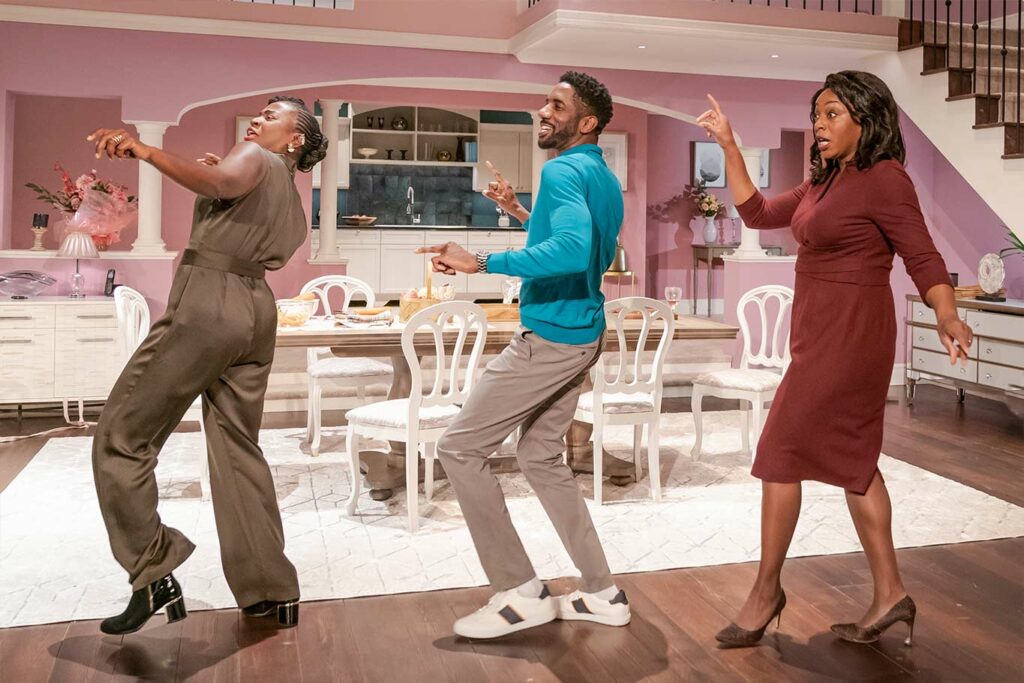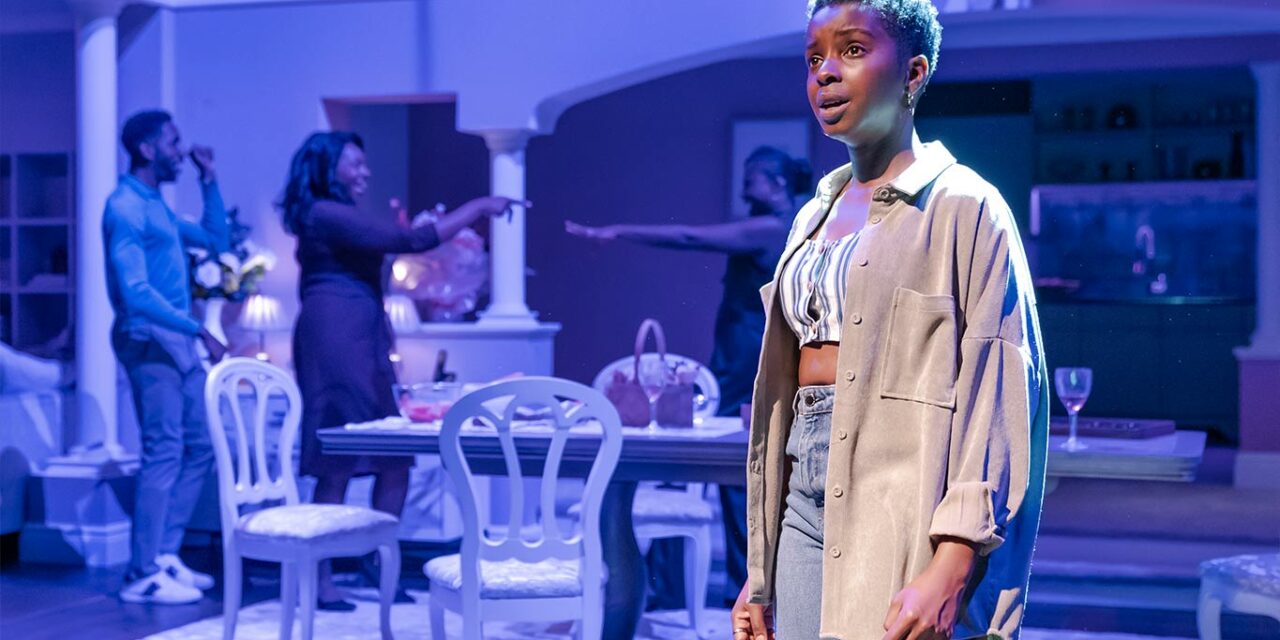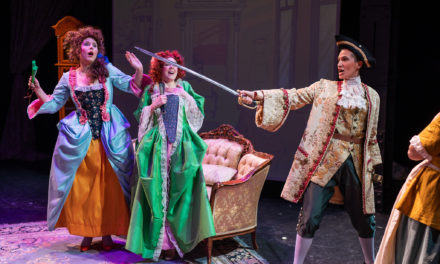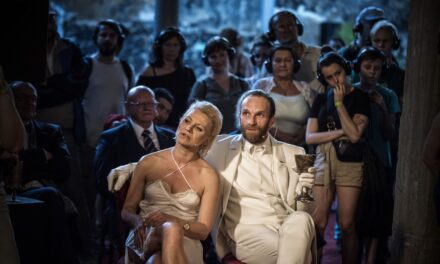Fairview is a scorching minefield that looks like a green meadow. At long last, London audiences can enter the beguiling terrain of Jackie Sibblies Drury’s 2018 play in a flawless Young Vic production directed by Nadia Latif.
Rightly laurelled with both the Pulitzer Prize and the Susan Smith Blackburn Prize, Fairview is an exceptional work of staggering wit. And it poses exceptional problems for anyone intent on writing about it. Explicating its abundant ingenuities is tantamount to tarnishing the powerful experience it offers to prospective spectators and readers. This is a play that sets great store by keeping its audience at once riveted and confused. It casts its spell patiently, and with virtuosity. And what a spell it is: it goes for the heart, electrifies the mind, and moves the body.
Still, one could begin at the beginning, with the curtains going up on a black woman who is peeling carrots in a stylish living room. In retrospect, her first line encapsulates the whole play. “What are you looking at?”, Beverly (Nicola Hughes) asks her husband Dayton (Rhashan Stone), who sneaks up on her from the kitchen. So begins Act One, which depicts a mildly funny scene from what appears to be a comedy about a black middle-class family. Beverly and Dayton are soon joined by Beverly’s sister Jasmine (Naana Agyei-Ampadu) and their daughter Keisha (Donna Banya), who are all assembled to celebrate Grandma’s birthday. Dinner preparations are underway. Familial bickering goes steady, though Beverly’s panic escalates. On closer inspection, their nimbly stylized renderings seem to flirt with corrosive stereotypes of African Americans. Think a lot of dancing and sassy snapping. Think “attitude.”
Then there is Act Two, which “watches” Act One. As the entire first act is replayed without any sound, we listen to a hilariously wayward conversation among four white characters about the holy trinity of race, class, and gender in America. The question that launches a thousand grotesque (but trenchantly familiar) claims is this: if you could choose to be a different race, what race would you be? It’s a question whose cascading, shocking answers comment directly on—and ultimately dub—the onstage drama, especially as it continues beyond the end of Act One.
And then there is an Act Three, which is better left in the dark. Suffice it to say that this is where the Frasier family’s already-distorted narrative is violently, outrageously hijacked. The result is an unpredictable and spellbinding coup de théâtre whose reflexive energies end up engulfing the audience.

Naana Agyei-Ampadu, Rhashan Stone, and Nicola Hughes in Fairview at the Young Vic. Photo: Marc Brenner
What Drury accomplishes in Fairview is nothing short of revelatory. She not only deconstructs and reassembles the conventional three-act structure, but does so in a stunningly searching framework that asks endless questions about race, representation, and responsibility. The play’s layered title becomes a through-line to its central concerns. One must remember that the word “fair” has many meanings: “reasonable,” “just,” “pale,” “good,” and “beautiful” are only some of them. By successively enacting, calling out, and revolting against the white gaze, Fairview puts pressure on that sweet, sweet spot between ethics and aesthetics, particularly as they collide in the physical space of the theatre. That spot is where power resides and regenerates—the power of the subject over the object, of the audience over the actor, of one race over another.
Drury also pulls into this collision course our traditional discourses of realism. Jasmine, for instance, mentions at some point how family dramas portray “real stories about real people.” A fair view of real people, that is. But to encounter “a slice of life,” one first needs to decide whose life will be sliced into pieces. Who will make that decision? Who will cut that slice, and how? Who will taste and savor it? Fairview ruminates on these questions with dazzling and daring originality. And even though it throws the spotlight on America, its sinuous examination of identity, agency, and systemic misrepresentation proves just as shattering when encountered across the Atlantic.
Fairview is a demanding play to experience and process, and an even more demanding play to deliver well. But Nadia Latif’s impeccable production overcomes every single obstacle with admirable poise. Her superb cast has a nearly balletic sense of the characters’ structural twists and turns. While the Frasiers are brought to life with the amiable relish of a slow-burning sitcom, the four white characters (d)evolve from perfectly inflected phantom voices to jaw-dropping wrecking balls. David Dawson, Julie Dray, Matthew Needham, and Esther Smith are uniformly outstanding in these roles. Having also seen Sarah Benson’s production at Soho Rep, I can’t help but point out that the seismic shifts of Act Three are conveyed more clearly in Latif’s staging, largely due to these four actors’ razor-sharp performances.
Malik Nashad Sharpe’s sinewy choreography allows this cast to inhabit—and disown—Tom Scutt’s meticulously expansive set in sprightly ways. This chic, though ever-so-slightly gauche, living room comes inundated with pink and beige, but lets its pastel palette be ripped apart by an influx of fake food and sensuous costumes. Jessica Hung Han Yun’s carefully manic lighting and Xana’s bass-heavy sound design help this shape-shifting drama reach its unsettling destination through arrestingly zany moments.
This is, through and through, an excellent take on an excellent play. It is not every day that a production leaves you at once stunned, wrecked, and eager to talk about it for days on end. Fairview is that rare, darkly incandescent gem—unmissable and unforgettable. One for the books.
This post was written by the author in their personal capacity.The opinions expressed in this article are the author’s own and do not reflect the view of The Theatre Times, their staff or collaborators.
This post was written by Mert Dilek.
The views expressed here belong to the author and do not necessarily reflect our views and opinions.


















